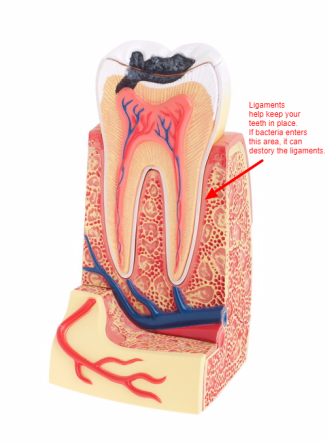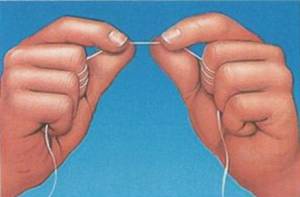
If your gums are red and sore and/or you’ve been brushing your teeth and spitting out blood into the basin, has it not occurred to you that something no so good is starting to occur in your mouth? The thing is, denial is a powerful thing, and often you just don’t want to believe that something is not right, or if something bad is happening in front of your eyes.
I’ll give you a perfect example of denial. A few years back I’d been steadily putting on weight and had even taken to buying the next size up in clothes. The thing was that no-one mentioned it to me (probably out of fear that I’d be angry or upset) and even when I saw myself in photos, I thought the camera was playing a bit of a trick and making me look larger than I was. In all this time, we didn’t have a set of scales in the house and it wasn’t until I eventually had the courage to step on to my mother in law’s scales that I finally accepted the extra weight that I had put on – 35 lbs. to be precise! The scales couldn’t be ignored and this shocked me into going on a weight loss program.
So, what does this have to do with gum disease?
Well you too could be in a state of denial and you may even be wondering why me?
One of the most common reasons for gum disease, also called periodontal disease; more specifically, gingivitis in its earlier stages and periodontitis in the more serious stages, may be due to a failure to floss your teeth on a regular basis. However, certain conditions, such as hormonal changes during pregnancy, diabetes, chemotherapy drugs and dry mouth caused by certain prescription medications, can all exacerbate the situation. In fact, for some people, gum disease can even be genetic.
If you don’t floss your teeth, there’s a greater risk of developing gum disease; but you’re certainly not alone if you don’t floss. In fact, according to a study carried out not so long ago by the Center for Disease Control (CDC), almost forty percent of people said that they didn’t floss every day and a huge 32 percent said that they never floss. So, it’s hardly surprising that nearly 50% of US adults over the age of 30 are suffering from some form of gum disease.
Think about it for a second …..
 Flossing may seem like an inconvenience, something that you can’t be bothered with; but, it need take no more than a minute or two of your time and the savings are immense.
Flossing may seem like an inconvenience, something that you can’t be bothered with; but, it need take no more than a minute or two of your time and the savings are immense.
Not only can regular flossing save you from losing teeth due to gum disease, but it can save you a heap on expensive dental treatments too.
What are the signs of gum disease? What should you be looking for?
- Swollen or red gums
- Gums that feel tender or bleed
- Bad breath that lingers
- Loose teeth
- Painful chewing
- Sensitive teeth
- Gums that are receding making teeth look longer
Healthy gums should feel firm, be pink in appearance, and not bleed when flossing. If you’ve got any of the symptoms mentioned above, then chances are you’ve got gum disease. Your dentist can confirm your fears and give you a diagnosis of gum disease using a variety of methods, including visual exams, dental x-rays and measuring the space between your teeth and gums.
Now for some good news…..
Gum disease in its early stages, known as gingivitis, can be easily cured and prevented from re-occurring simply by stepping up your oral health routine.
Periodontitis on the other hand, is a more advanced form of gum disease, which requires more treatment and, if ignored, can result in tooth loss.
People react to the news that they have gum disease in a variety of ways. Some are angry and feel they should blame their dentist for having arrived at this situation. The thing is, we’re always harping on about the importance of dental flossing, and like the old saying goes “You can take a horse to the water but you can’t make it drink”. We do all we can to encourage you to care for your teeth properly at home as well as visit us regularly, but unfortunately, we can’t get through to some folks despite our best efforts.
Others are more skeptical. “Well can’t you just give me a regular clean?” “Do I really need this deep cleaning treatment you’re talking about”.
As dentists, our job is to firstly tell you the truth and secondly to help you have the healthiest smile. If we diagnose gum disease, then we can’t and won’t carry out additional treatments which could make your condition worse, or harm you in any way. Deep dental cleaning or scaling and planning (SRP) as it’s called is not an “add on” treatment to get more money from you. It’s the necessary treatment for your diagnosis.
We’re sorry if you’re frustrated because you wanted your teeth whitened or you wanted to surge ahead with that dental implant, but until we’ve dealt with the infection and inflammation of periodontitis, then it may have to wait.
I guess what we’re trying to say is don’t give up if you’ve been diagnosed with gum disease. It is treatable and curable. You can soon improve your oral hygiene at home and many dental insurance policies will cover you for gum disease treatment. Meanwhile we can give you plenty of useful hints and tips.
So please, no more denial. Just accept your diagnosis. All we’re asking is for you to commit to improving your oral hygiene and we’ll help with the rest.
You can do it!